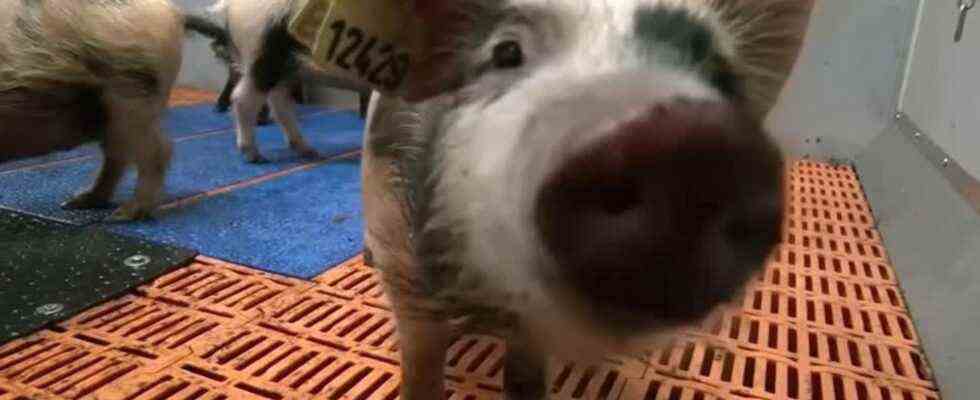These pigs or their fellow pigs could save the lives of people with heart disease in the future. with their organs. At the Chair of Molecular Animal Breeding and Biotechnology at LMU Munich, Professor Eckhard Wolf and his colleagues are researching the possibilities of heart transplantation from pigs to humans. “We work in the field of xenotransplantation. Our task is to genetically modify the donor pigs in such a way that their organs are not rejected after the transplantation in humans. How do we do that: We have to introduce genetic modifications for this, namely switching off three pig genes and add at least two human genes. It’s all done in cultured pig cells. We then look for the cells in which the modification worked. And then we use the cells for nuclear transfer, which means cloning using the Dolly technique first to produce embryos from the cells.” These are then planted in recipient animals in the pig breeding facility. The genetically modified pigs are then born after 114 to 116 days. The scientists selected comparatively small breeds of pigs. The size of their hearts suits man better. These pigs are also not susceptible to certain viruses, another advantage. These specimens are three months old. “Our facility is approved for keeping and breeding animals for experimental purposes. The animals are given much more space there than in normal agricultural husbandry. We have special hygiene measures. This means that the facility may only be entered via a hygiene lock, where you have to change completely and shower. We also have a specially treated lining, special ventilation to make sure that pathogens just don’t get into the facility.” Pigs that are bred, whose genome is manipulated to provide organs to humans? As a spare parts store, as opponents say. Kristina Berchtold is spokesperson for the Munich Animal Welfare Association and knows the complexity of the issue. “As animal rights activists, we have understanding for anyone who advocates xenotransplantation. But in terms of animal welfare, it is not justifiable. And it is also another way for humans to exploit and abuse an animal.” In January, a team at the University of Maryland in the United States succeeded for the first time in transplanting a genetically modified pig heart into a terminally ill human. Three weeks after the operation, the man was doing well. In the past week, however, his doctors warned of further risks: infections, rejection and high blood pressure. Once again Professor Wolf from the LMU Munich: “The donor pig that was used in the USA was a cloned pig. This means that it was produced from tenfold genetically modified cells by nuclear transfer. This is safe for routine clinical use not the right way. Because cloning itself can also have side effects that we want to avoid. We will definitely create our donor pigs by breeding. That means we will only generate the founder animals via cloning and then all further generations, so to speak, completely create normally by breeding.” After the successful pilot experiment in the USA, it can be expected that similar studies could also be run in Germany in the next two to three years, with a view to the heart, but also to the kidneys. Because the need is even greater for them, according to Professor Wolf.

